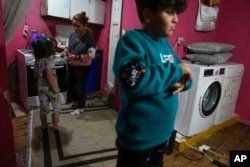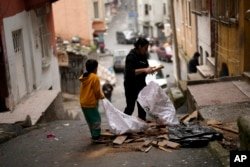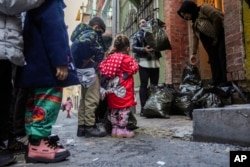In a dark one-room apartment in one of Istanbul’s poorest neighborhoods, 11-year-old Atakan Sahin lies on a bare sofa with his siblings to watch TV while their mother stirs a pot of pasta.
An entire family of six can look forward to a simple meal most evenings. Atakan, his two younger brothers and 5-year-old sister are among the one-third of Turkish children living in poverty.
“Look at the condition of my children,” said Rukiye Sahin, 28. “I have four children. They don’t get to eat chicken, they don’t get to eat meat. I send them to school with torn shoes.”
Currency devaluation and persistent high inflation caused by unconventional economic policies, which President Recep Tayyip Erdogan adopted but later abandoned, have left many families struggling for food and housing.
Experts say it is creating a lost generation of children who have been forced to grow up too quickly to help their families survive.
Nearly 7 million of Türkiye’s approximately 22.2 million children live in poverty, according to a 2023 joint report by UNICEF and the Turkish Statistics Institute.
Look at neighborhoods like Istanbul’s Tarlabaği, where the Sahin family lives.
Sahin eats while sitting on the floor of her room – stay on the same floor and her husband sleeps while their children sit on the sofa. On cold nights in early December, pieces of wood are burned on the stove to keep warm. They sometimes fall asleep to the sound of rats moving around in the building.
Atakan spends his days helping his father clean out trash bins in search of recyclable materials to earn a modest income for his family.
Poor children in Istanbul also earn money for their families by selling small items such as pens, tissues or bracelets in bars and cafes in the city’s entertainment districts, often working late into the night.
“I can’t go to school because I don’t have money,” Atakan said. “We have nothing. Can you tell me how I can go? On sunny days, when I don’t go to school, I collect plastic and other things with my father. Whatever we get Yes, we will sell it.”
Cash helps buy basic foods and pay for their siblings to go to school. On the days that Atakan can attend, he is not adequately equipped to succeed, lacking proper shoes, a coat, and textbooks for his favorite English class.
Sahin is struggling to raise money to cover rent, utilities and other basic expenses as the cost of living crisis continues to rise in Turkey. Inflation was 47% in November, reaching 85% by the end of 2022. Food and non-alcohol beverage prices were 5.1% higher in November than the previous month.
Under these circumstances, a generation of children is growing up rarely enjoying a full diet of fresh meat or vegetables.
Stay and her husband receive 6,000 lira ($173) a month in government welfare to help with school costs, but they pay the same amount for rent on their home.
“My son says, ‘Mom, it’s raining, my shoes are getting wet.’ But what can I do?” Wait said. “The state does not help me. I am alone in this room with my children. Who else do I have besides them?”
The image of children sifting through garbage to help feed their families is a far cry from the image that Turkey presents to the world: that of an influential world power with a vibrant economy ripe for foreign investment.
Speaking at the G20 summit in November, Erdogan described Turkey’s social security system as one of the “most comprehensive and inclusive” in the world. “Our aim is to ensure that not even a single poor person remains. We will continue our work until we achieve this,” he said.
Finance Minister Mehmet Simsek, who is responsible for imposing austerity and curbing inflation, said the 17,000 lira ($488) monthly minimum wage was not low. But he has promised to increase it as soon as possible.
Although the government allocates billions of lira to struggling families, inflation eats up any aid the state provides.
Experts say welfare payments are not enough for the millions who depend on them.
Volunteers are trying to reduce the cycle of deprivation.
Mehmet Yerlan, 53, a former restaurant owner, brings essentials, including coats, notebooks and the occasional bag of rice, to the poor people of Tarlabasi.
He said, “Families are in very difficult circumstances. They cannot buy food for their children and send them to school. Children are on the streets, selling clothes to support their families. We have deep poverty here. are looking.”
Poverty researcher and activist Heiser Foggo said that children are forced to leave school to work or are enrolled in vocational programs where they work four days and study one day per week, and Receive a small portion of the minimum wage.
“Look at the condition of the children,” he said. “Twenty million of them are in deep poverty. Child labor has become very common. Families choose these education-work programs because the children bring in some income. It’s not real education, just cheap labor.”
UNICEF ranked Turkey 38th out of 39 European Union or Organization for Economic Co-operation and Development countries in terms of child poverty between 2019 and 2021, with a child poverty rate of 34%.
This is a situation that Waite understands completely.
He said, “We cannot move forward, we are always left behind… When you do not have money in your hands, you are always left behind.”
Meanwhile, his eldest son is clinging to his childhood dreams.
“I want to go to school regularly.” Atakan said, “I want everything to be fine…I would like to become a football player one day to support my family.”


